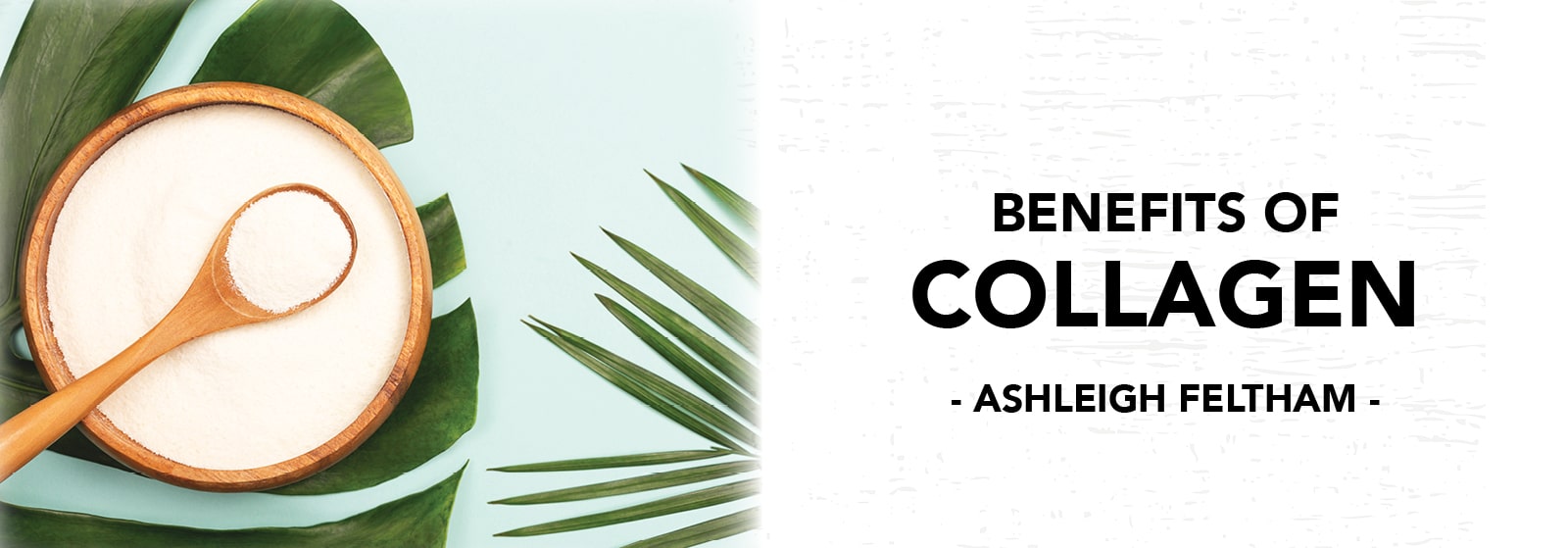When it comes to protein, most of the focus is on the benefits to your lean muscle mass. While the importance of protein on promoting and maintaining your lean muscle mass cannot be disregarded, certain proteins like collagen have other important roles in optimising your health and function.
Protein is made up of amino acids. Amino acids are the building blocks of protein. There are twenty amino acids in total and these form different types of protein based on the combination of amino acid building blocks. Different types of proteins have different roles in your body. One type of protein is called collagen.
Collagen is a type of protein whose main role is to create connective tissue in your body. This connective tissue makes up approximately twenty-five to thirty percent of all the protein content in your body. The main types of collagen are I, II, III, and IV. These are the most common types found in muscle tissue in your body (Gillies AR et al. 2011, Gelse K et al. 2003).
Collagen forms a scaffold and provides form, elasticity and structure to your entire body. Collagen also helps to anchor your cells together and also helps to support your joints, ligaments, and tendons, and is a part of your bones, gastrointestinal tract, hair, skin, and nails.
Collagen to Repair the Connective Tissue in Your Muscles
When you exercise force is transmitted through the connective tissue which connects your muscles to your bones and tendons. It was initially thought that connective tissue did not adapt but new research suggests that connective tissue is in a constant state of remodeling due to these forces and is highly adaptable (Babraj JA et al, 2005, Moore DR et al, 2005). It is estimated that your connective tissue has a turnover rate of around zero point five to two percent per day (Moore DR et al. 2005). This is around the same rate as the muscle fibres in your body. The two main contributing factors to the remodeling of collagen and the synthesis of new connective tissue are the forces placed on the connective tissue in exercise and your diet (Holwerda AM et al. 2018).
Research suggests the preferred type of protein to promote the growth and repair of lean muscle mass is rapidly digestible, high-quality, complete protein. ‘Complete protein’ means it contains all the essential amino acids that your body cannot make. For example, the proteins whey or casein are commonly used to promote lean muscle mass growth and repair (Gorissen SHM et al. 2018).
Collagen appears to be a superior protein compared to complete proteins for the promotion of growth and repair of the connective tissue between your muscles, your ligaments and tendons. This appears to be because collagen contains a sufficient amount of the amino acids glycine and proline. Collagen has around thirty three percent glycine and around ten percent proline. These two amino acids appear to be important in creating new connective tissue and repairing the connective tissue (Andrew M Holwerda et al, 2022).
What Does Your Body Need to Make Collagen
For your body to make collagen it needs protein, alongside the minerals copper and zinc, as well as vitamin C. In general, your body can make collagen by achieving a balanced diet with enough protein from whole foods sources such as lean red meat, poultry, seafood, legumes, nuts and seeds, dairy or alternatives including tofu and soy milk and sufficient fruits and vegetables. Many Australians would benefit from consuming collagen powder for reasons which may include not having a balanced diet, or not eating at the right time of day. Also, as we age our need for more dietary sources of collagen increases due to the body’s reduced ability to create this protein (Fisher GJ et al. 2006). In addition, athletes may also benefit from collagen supplementation due to increased rates of pressure and damage to the connective tissue which occurs from training.
How Much Collagen Do You Need to Promote Joint Recovery?
Research suggests that fifteen grams of collagen peptide supplementation is an optimal amount to promote joint health and restructure the connective tissue (Khatri M et al, 2021). A source of vitamin C with fifteen grams of collagen peptide supplementation, thirty to sixty minutes before a recovery session enhances the effects on joint health and recovery (Levine M et al, 2017). Physiotherapy for recovery causes your ligaments to move and therefore act like a sponge as it uses the available nutrients in your blood.
If you decide to include a collagen powder in your diet it is recommended to select one with no added sugar. Added sugar is recommended to contribute no more than 10% of your total daily calories so it’s best to select products when possible, without added sugar (Rakhra V, et al. 2020). It is also important to include the optimal amount of collagen powder required to support connective tissue growth and repair.
Take Home Message: If you wish to optimise the health of your joints, ensure that you are providing your body with enough nutrients for it to synthesise collagen. If you think your diet is lacking the required amount of whole food ingredients to promote the synthesis of collagen, you may benefit from including a collagen supplement in your diet.
References:
- Gillies AR, Lieber RL. Structure and function of the skeletal muscle extracellular matrix: skeletal muscle ECM. Muscle Nerve. 2011;44:318–331.
- Gelse K, Pöschl E, Aigner T. Collagens—structure, function, and biosynthesis. Adv Drug Deliv Rev. 2003;55:1531–1546.
- Babraj JA, Cuthbertson DJR, Smith K, et al. Collagen synthesis in human musculoskeletal tissues and skin. Am J Physiol-Endocrinol Metab. 2005;289:E864–E869.
- Moore DR, Phillips SM, Babraj JA, et al. Myofibrillar and collagen protein synthesis in human skeletal muscle in young men after maximal shortening and lengthening contractions. Am J Physiol-Endocrinol Metab. 2005;288:E1153–E1159.
- Holwerda AM, Paulussen KJM, Overkamp M, et al. Daily resistance-type exercise stimulates muscle protein synthesis in vivo in young men. J Appl Physiol. 2018;124:66–75.
- Gorissen SHM, Crombag JJR, Senden JMG, et al. Protein content and amino acid composition of commercially available plant-based protein isolates. Amino Acids. 2018;50:1685–1695.
- US Department of Agriculture. Beef, ground, 85% lean meat/15% fat, raw. FoodData Central. 2019. Available at: https://fdc.nal.usda.gov/fdc-app.html#/food-details/171796/nutrients.
- Khatri M, Naughton RJ, Clifford T, Harper LD, Corr L. The effects of collagen peptide supplementation on body composition, collagen synthesis, and recovery from joint injury and exercise: a systematic review. Amino Acids. 2021 Oct;53(10):1493-1506. doi: 10.1007/s00726-021-03072-x. Epub 2021 Sep 7. PMID: 34491424; PMCID: PMC8521576.
- Andrew M Holwerda, Luc J C van Loon, The impact of collagen protein ingestion on musculoskeletal connective tissue remodeling: a narrative review, Nutrition Reviews, Volume 80, Issue 6, June 2022, Pages 1497–1514, https://doi.org/10.1093/nutrit/nuab083
- Fisher GJ, Voorhees JJ. Decreased collagen production in chronologically aged skin: roles of age-dependent alteration in fibroblast function and defective mechanical stimulation. Am J Pathol. 2006 Jun;168(6):1861-8. doi: 10.2353/ajpath.2006.051302. PMID: 16723701; PMCID: PMC1606623.
- Levine M, Violet PC. Breaking down, starting up: can a vitamin C–enriched gelatin supplement before exercise increase collagen synthesis? Am J Clin Nutr. 2017;105(1):5-7.
- Rakhra V, Galappaththy SL, Bulchandani S, Cabandugama PK. Obesity and the Western Diet: How We Got Here. Mo Med. 2020 Nov-Dec;117(6):536-538. PMID: 33311784; PMCID: PMC7721435.






